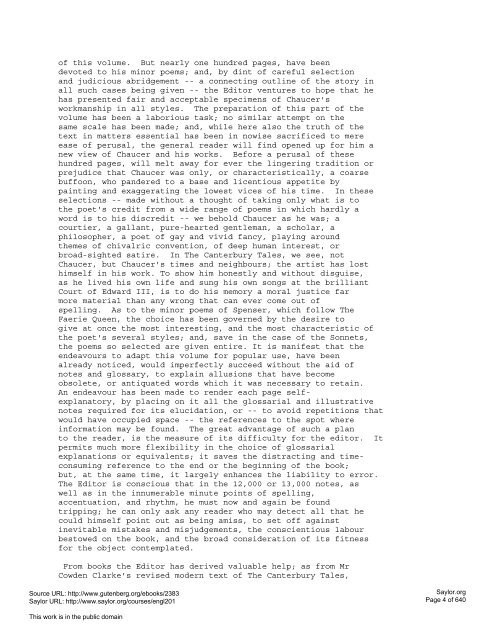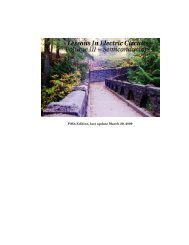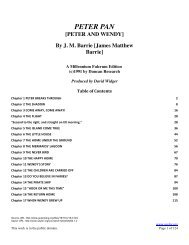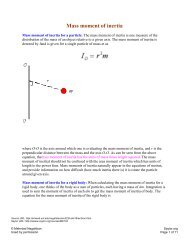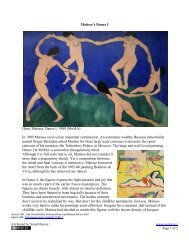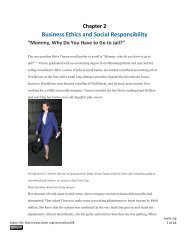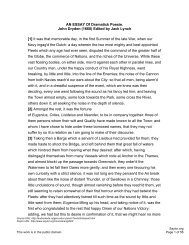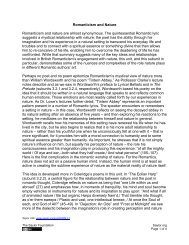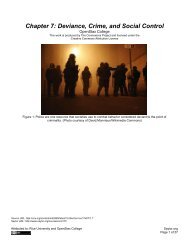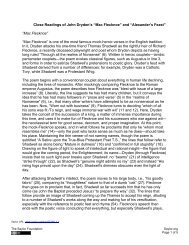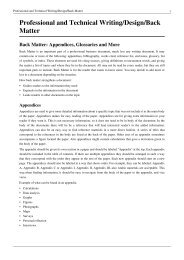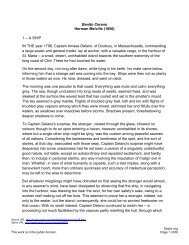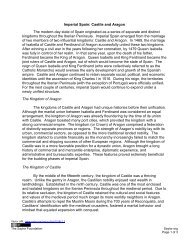- Page 1 and 2: THE CANTERBURY TALES And other Poem
- Page 3: unappreciated. As regards the manne
- Page 7 and 8: emains to us; if we believe that at
- Page 9 and 10: consequence, to find that his wife,
- Page 11 and 12: very year in which Petrarch transla
- Page 13 and 14: and high Court favour at this time,
- Page 15 and 16: duties by deputy. For some reason u
- Page 17 and 18: hour of the day is not easier to be
- Page 19 and 20: poetical work of Chaucer's is omitt
- Page 21 and 22: labours with examining the accounts
- Page 23 and 24: In fellowship*, and pilgrims were t
- Page 25 and 26: Of grease, when she drunken had her
- Page 27 and 28: As for to deale with no such pourai
- Page 29 and 30: At sessions there was he lord and s
- Page 31 and 32: She hadde passed many a strange str
- Page 33 and 34: Now is not that of God a full fair
- Page 35 and 36: Dishevel, save his cap, he rode all
- Page 37 and 38: And homeward he shall tellen other
- Page 39 and 40: 8. Algesiras was taken from the Moo
- Page 41 and 42: 38. Chaucer here satirises the fash
- Page 43 and 44: This Duke, of whom I make mentioun,
- Page 45 and 46: When that this worthy Duke, this Th
- Page 47 and 48: That is so low y-brought by tyranny
- Page 49 and 50: He weepeth, waileth, crieth piteous
- Page 51 and 52: And Venus slay'th me on that other
- Page 53 and 54: From year to year full privily his
- Page 55 and 56:
And yet doth Juno me well more sham
- Page 57 and 58:
The purveyance*, that God hath seen
- Page 59 and 60:
As well as-to a proud dispiteous* m
- Page 61 and 62:
Walled of stone, and ditched all wi
- Page 63 and 64:
The shepen* burning with the blacke
- Page 65 and 66:
Ye knowe well, that every lusty kni
- Page 67 and 68:
"Fairest of fair, O lady mine Venus
- Page 69 and 70:
But suddenly she saw a sighte quain
- Page 71 and 72:
That knew so many of adventures old
- Page 73 and 74:
No longer then the tourneying shall
- Page 75 and 76:
Saturnus saide: "Daughter, hold thy
- Page 77 and 78:
Al one, withouten any company. Fare
- Page 79 and 80:
And covered with the arms of Dan Ar
- Page 81 and 82:
For it is proved by experience; But
- Page 83 and 84:
Chaucer was indebted to Boccaccio,
- Page 85 and 86:
28. Roundelay: song coming round ag
- Page 87 and 88:
55. Every deal: in every part; "dea
- Page 89 and 90:
87. Y-wrie: covered, hid; Anglo-Sax
- Page 91 and 92:
Notes to the Prologue to the Miller
- Page 93 and 94:
And said; "I will not kiss thee, by
- Page 95 and 96:
This nigh Nicholas stood still in h
- Page 97 and 98:
That if thou wraye* me, thou shalt
- Page 99 and 100:
He sigheth, with full many a sorry
- Page 101 and 102:
Dark was the night as pitch or as t
- Page 103 and 104:
It was for nought, no man his reaso
- Page 105 and 106:
tellers to the saviour after he had
- Page 107 and 108:
Say forth thy tale, and tarry not t
- Page 109 and 110:
Of twenty year, withouten any mo, S
- Page 111 and 112:
She said; "Alas! your horse went to
- Page 113 and 114:
He mighte do us both a villainy*."
- Page 115 and 116:
She ween'd* the clerk had wear'd a
- Page 117 and 118:
THE COOK'S TALE. THE PROLOGUE. THE
- Page 119 and 120:
Better is rotten apple out of hoard
- Page 121 and 122:
The tree of Phillis for her Demopho
- Page 123 and 124:
I were right now of tales desolate*
- Page 125 and 126:
For in this woe I may not long endu
- Page 127 and 128:
"Lordes," she said, "ye knowen ever
- Page 129 and 130:
Were all *to-hewn and sticked* at t
- Page 131 and 132:
She was so diligent withoute slouth
- Page 133 and 134:
Deeper into this case, the truth to
- Page 135 and 136:
This messenger, to *do his avantage
- Page 137 and 138:
He can me keep from harm and eke fr
- Page 139 and 140:
Is complaining: how many may men fi
- Page 141 and 142:
There is no man could bring her to
- Page 143 and 144:
This King Alla, when he his time se
- Page 145 and 146:
18. Stound: short time; German, "st
- Page 147 and 148:
Hath not every vessel all of gold;
- Page 149 and 150:
And that they had me given all thei
- Page 151 and 152:
That saith this proverb in his Alma
- Page 153 and 154:
Since ye so preach of Jobe's patien
- Page 155 and 156:
That Jenkin clerk, and my gossip, D
- Page 157 and 158:
This made him wood* with me all utt
- Page 159 and 160:
Than with a woman using for to chid
- Page 161 and 162:
3. Jesus and the Samaritan woman: J
- Page 163 and 164:
And saith his matins and his holy t
- Page 165 and 166:
But home he went, for he might not
- Page 167 and 168:
"Amended!" quoth this knight; "alas
- Page 169 and 170:
And call him father, for your gentl
- Page 171 and 172:
THE FRIAR'S TALE. THE PROLOGUE. Thi
- Page 173 and 174:
He could summon, on pain of Christe
- Page 175 and 176:
I weened ye were a yeoman truly. *t
- Page 177 and 178:
When that they came somewhat out of
- Page 179 and 180:
and arrow. 4. Ribibe: the name of a
- Page 181 and 182:
Had preached at a church in his man
- Page 183 and 184:
"Chide him right well, for sainte c
- Page 185 and 186:
Workers of Godde's word, not audito
- Page 187 and 188:
'A lord is lost, if he be vicious.
- Page 189 and 190:
And fetch'd his fellow, there as la
- Page 191 and 192:
Upon the nave, and make him let a f
- Page 193 and 194:
23. Mr. Wright says that "it was a
- Page 195 and 196:
And many another delectable sight;
- Page 197 and 198:
"Let me alone in choosing of my wif
- Page 199 and 200:
And eke of other ornamentes all Tha
- Page 201 and 202:
Wond'ring upon this word, quaking f
- Page 203 and 204:
This marvellous desire his wife t'a
- Page 205 and 206:
And thus she said in her benigne vo
- Page 207 and 208:
I have not had no part of children
- Page 209 and 210:
The rude people, as no wonder is, W
- Page 211 and 212:
That I shall go, I will go when you
- Page 213 and 214:
That never was there seen with mann
- Page 215 and 216:
And when this Walter saw her patien
- Page 217 and 218:
Follow Griselda in humility, For it
- Page 219 and 220:
Bath's Tale. 6. Very: true; French
- Page 221 and 222:
2. Saint Thomas of Ind: St. Thomas
- Page 223 and 224:
Upon his bare knees ought all his l
- Page 225 and 226:
I feel me now here hoar but on my h
- Page 227 and 228:
And with that word they rise up sud
- Page 229 and 230:
The Wife of Bath, if ye have unders
- Page 231 and 232:
Performed hath the sun his arc diur
- Page 233 and 234:
None other cause mighte make him ta
- Page 235 and 236:
Every wight is fain to speak him go
- Page 237 and 238:
That he'll not find it out in some
- Page 239 and 240:
Experience so proves it every day,
- Page 241 and 242:
(Ladies, I pray you that ye be not
- Page 243 and 244:
6. Stopen: advanced; past participl
- Page 245 and 246:
THE SQUIRE'S TALE. THE PROLOGUE. "H
- Page 247 and 248:
Nor of their swannes, nor their her
- Page 249 and 250:
But sickerly, withouten any fable,
- Page 251 and 252:
And eke the wine, in all this melod
- Page 253 and 254:
For right anon she wiste* what they
- Page 255 and 256:
So deep in grain he dyed his colour
- Page 257 and 258:
He saw upon a time a kite flee,* *f
- Page 259 and 260:
"Poille," in Italian "Puglia" -- we
- Page 261 and 262:
Till that Mercurius' house, the sly
- Page 263 and 264:
Against her will, nor kithe* her je
- Page 265 and 266:
But when she saw the grisly rockes
- Page 267 and 268:
Had gone where I should never come
- Page 269 and 270:
Up caught him, and to bed he hath h
- Page 271 and 272:
He saw, when voided* were the wilde
- Page 273 and 274:
And to the temple his way forth hat
- Page 275 and 276:
Why should I more examples hereof s
- Page 277 and 278:
As of the truest and the beste wife
- Page 279 and 280:
6. Warished: cured; French, "guerir
- Page 281 and 282:
["YEA, let that passe," quoth our H
- Page 283 and 284:
Now keep them well, for if ye will
- Page 285 and 286:
"I deem* anon this clerk his servan
- Page 287 and 288:
second. 7. Judges xi. 37, 38. "And
- Page 289 and 290:
Then have I in latoun* a shoulder-b
- Page 291 and 292:
Now hold your peace, my tale I will
- Page 293 and 294:
And thenne will he say, Samsoun! Sa
- Page 295 and 296:
For to beware of such an adversary;
- Page 297 and 298:
We draw, and let see where the cut
- Page 299 and 300:
And ware* you from the sin of avari
- Page 301 and 302:
12. Defended: forbidden; French, "d
- Page 303 and 304:
1. The Prologue here given was tran
- Page 305 and 306:
And thus he sat, till it was passed
- Page 307 and 308:
That I you swear, and plighte you m
- Page 309 and 310:
To Saint Denis y-comen is Dan John,
- Page 311 and 312:
For, by my troth, I have on mine ar
- Page 313 and 314:
Of thee, and of the white lily flow
- Page 315 and 316:
Is this to you a thing that is hone
- Page 317 and 318:
As ye have heard; and, when that I
- Page 319 and 320:
He seemeth elvish* by his countenan
- Page 321 and 322:
"Ah, Saint Mary, ben'dicite, What a
- Page 323 and 324:
His steede was all dapple gray, It
- Page 325 and 326:
19. Romances that be royal: so call
- Page 327 and 328:
THE TALE. A young man called Melibo
- Page 329 and 330:
Up rose then an advocate that was w
- Page 331 and 332:
enemies, choosing of the former suc
- Page 333 and 334:
undeserved tribulations of the sain
- Page 335 and 336:
liketh unto your goodness, that we
- Page 337 and 338:
and the power that is given him. An
- Page 339 and 340:
Our Hoste said, "As I am faithful m
- Page 341 and 342:
4. Though he were shorn full high u
- Page 343 and 344:
But now is he in prison in a cave,
- Page 345 and 346:
In rain, with wilde beastes walked
- Page 347 and 348:
To Odenate, a prince of that count
- Page 349 and 350:
Shall bear a distaff, *her cost for
- Page 351 and 352:
But he made every man *reny his law
- Page 353 and 354:
Thy six fortune hath turn'd into a
- Page 355 and 356:
His royal throne might him not avai
- Page 357 and 358:
1. The Monk's Tale is founded in it
- Page 359 and 360:
28. Pedro the Cruel, King of Aragon
- Page 361 and 362:
courtesy to priests. 3. Attamed: co
- Page 363 and 364:
And oft of fume,* and of complexion
- Page 365 and 366:
A dung cart, as it went for to dung
- Page 367 and 368:
And was y-slain anon of Achilles. B
- Page 369 and 370:
There as he was full merry and well
- Page 371 and 372:
Of Rome, cried the senatores' wives
- Page 373 and 374:
of a more local boast, as vaunting
- Page 375 and 376:
precentor of Canterbury, wrote a La
- Page 377 and 378:
Which that men call in English idle
- Page 379 and 380:
Or elles, lo, this maiden's name br
- Page 381 and 382:
That had a book with letters of gol
- Page 383 and 384:
Tiburce answer'd, and saide, "Broth
- Page 385 and 386:
With piteous teares told it anon ri
- Page 387 and 388:
That ilke* stone a god thou wilt it
- Page 389 and 390:
11. Engine: wit; the devising or co
- Page 391 and 392:
(But I will not avowe* that I say,
- Page 393 and 394:
conspirator believes that everythin
- Page 395 and 396:
The bodies sev'n eke, lo them here
- Page 397 and 398:
As usage is, let sweep the floor as
- Page 399 and 400:
Believe this as sicker* as your cre
- Page 401 and 402:
And while he busy was, this fiendly
- Page 403 and 404:
And while this priest was in his bu
- Page 405 and 406:
Maken assay, at such time as he wou
- Page 407 and 408:
ceases wholly where the opening of
- Page 409 and 410:
A thief him might full* rob and bin
- Page 411 and 412:
3. The mention of the Cook here, wi
- Page 413 and 414:
That be untrue, and nothing by wome
- Page 415 and 416:
Thou and thine offspring ever shall
- Page 417 and 418:
As we were ent'ring at a thorpe's*
- Page 419 and 420:
sure of their salvation, even thoug
- Page 421 and 422:
more chiding, and the more deadly h
- Page 423 and 424:
that is to say the devil's bellows,
- Page 425 and 426:
and that in sundry wise: this is to
- Page 427 and 428:
scorning, treachery, sowing of stri
- Page 429 and 430:
occasions for that sin to which he
- Page 431 and 432:
short, for [in order] it should be
- Page 433 and 434:
eplenished with the sight of the pe
- Page 435 and 436:
1. The genuineness and real signifi
- Page 437 and 438:
Poems of Virgil take here no root,
- Page 439 and 440:
told him that he ought to have come
- Page 441 and 442:
The fourth statute, To *purchase ev
- Page 443 and 444:
To save thy lady's honour ev'rywher
- Page 445 and 446:
And mighty Samson, which beguiled t
- Page 447 and 448:
to see;" and the subtle-piercing be
- Page 449 and 450:
As rose so red, throughout her visa
- Page 451 and 452:
"O Fortune cursed, why now and wher
- Page 453 and 454:
I spied him soon; to God I make avo
- Page 455 and 456:
to her lover, apparently in continu
- Page 457 and 458:
My lady gan me suddenly behold, And
- Page 459 and 460:
25. Solomon was beguiled by his hea
- Page 461 and 462:
Day; where Emily, "doing observance
- Page 463 and 464:
How sore, y-wis, there wot no wight
- Page 465 and 466:
And for that skill,* 'ocy, ocy,' I
- Page 467 and 468:
The next May, if I be not afraid. "
- Page 469 and 470:
1. These two lines occur also in Th
- Page 471 and 472:
Yet happeth me full oft in books to
- Page 473 and 474:
In looking of mine old book all to-
- Page 475 and 476:
There ever is clear day, and never
- Page 477 and 478:
That there ne were prest,* in her p
- Page 479 and 480:
"But natheless, in this condition M
- Page 481 and 482:
For I will, of mine own authority,
- Page 483 and 484:
That brought thee forth, thou most
- Page 485 and 486:
to him concerning the future state
- Page 487 and 488:
21. Callisto, daughter of Lycaon, w
- Page 489 and 490:
forth, much to the astonishment of
- Page 491 and 492:
which follow Virtue and during qual
- Page 493 and 494:
And as I stood, and cast aside mine
- Page 495 and 496:
Into the middest of the mead each o
- Page 497 and 498:
Some brake his spear, some threw do
- Page 499 and 500:
Toward them, and the knightes eke *
- Page 501 and 502:
"And those that weare chaplets on t
- Page 503 and 504:
I must follow the greate company, T
- Page 505 and 506:
25. Under support of them that list
- Page 507 and 508:
*Ne can them not,* nor ever think *
- Page 509 and 510:
Of golde work, than I saw ever. But
- Page 511 and 512:
of his "great ruth," "For that thou
- Page 513 and 514:
In Fame's House, full of tidings, B
- Page 515 and 516:
And not away with stormes beat; For
- Page 517 and 518:
And Pythonesses, charmeresses, And
- Page 519 and 520:
Herself then wonderfully stretch'd,
- Page 521 and 522:
And next him on a pillar was Of cop
- Page 523 and 524:
His clarions to beare tho,* *then A
- Page 525 and 526:
To hide their good workes eke, And
- Page 527 and 528:
And *do it blow* in clarioun. *caus
- Page 529 and 530:
Men might have heard it easily To R
- Page 531 and 532:
That well unnethes* in that place *
- Page 533 and 534:
But at the last I saw a man, Which
- Page 535 and 536:
tyrant of Corinth. The story of his
- Page 537 and 538:
character of Hermes enough to warra
- Page 539 and 540:
78. To put an ape into one's hood,
- Page 541 and 542:
eturn the love of Troilus; which he
- Page 543 and 544:
Apollo, knew that Troy should be de
- Page 545 and 546:
Was full unware that love had his d
- Page 547 and 548:
If so thou do, thy wit is well bewa
- Page 549 and 550:
etter becomes to sit in a cave and
- Page 551 and 552:
An easy pace riding, in *routes twa
- Page 553 and 554:
And though that I mine hearte set a
- Page 555 and 556:
Nor scrivener-like, nor craftily it
- Page 557 and 558:
And high or low, after* a wight int
- Page 559 and 560:
"As to my lady chief, and right res
- Page 561 and 562:
Such manner folk; what shall I call
- Page 563 and 564:
Withoute word, so that it was no ne
- Page 565 and 566:
But Troilus, all *whole of cares co
- Page 567 and 568:
Dispiteous* Day, thine be the pains
- Page 569 and 570:
THE FOURTH BOOK A BRIEF Proem to th
- Page 571 and 572:
"O Death, alas! *why n'ilt thou do
- Page 573 and 574:
Troilus protests that his lady shal
- Page 575 and 576:
For all too little hath she with us
- Page 577 and 578:
That it shall come, therefore the p
- Page 579 and 580:
That all this thing was said *of go
- Page 581 and 582:
And to you angry Parcae,* Sisters t
- Page 583 and 584:
visited Sarpedon only to fetch fire
- Page 585 and 586:
Gan *in himself assure,* and thus h
- Page 587 and 588:
And therewithal she cast her eyen d
- Page 589 and 590:
It seemeth not ye take as for the b
- Page 591 and 592:
And in himself he laugh'd right at
- Page 593 and 594:
of which the poet so often speaks.
- Page 595 and 596:
i.e. although he was not over-forwa
- Page 597 and 598:
70. Pandarus, as it repeatedly appe
- Page 599 and 600:
of the marriage of John of Gaunt, t
- Page 601 and 602:
Beauty, and looks, ever-in-one,* *c
- Page 603 and 604:
Present* the queen and other mo', *
- Page 605 and 606:
And with them bode* till it was day
- Page 607 and 608:
And turn all joy to penances; And b
- Page 609 and 610:
And well approv'd of *uncouth kind,
- Page 611 and 612:
1. The birds on the weathervanes we
- Page 613 and 614:
whatever circumstances, undertaken,
- Page 615 and 616:
That in this darke world me winds*
- Page 617 and 618:
When that the sun out of the south
- Page 619 and 620:
The mountance* of a furlong way of
- Page 621 and 622:
And the Parliament of Fowles, as I
- Page 623 and 624:
In remembrance of her, and in honou
- Page 625 and 626:
een celebrated in The Franklin's Ta
- Page 627 and 628:
Comfort is none, but in you, Lady d
- Page 629 and 630:
We have none other melody nor glee,
- Page 631 and 632:
To penitents that be *to mercy able
- Page 633 and 634:
L'Envoy. Forthe, complaint! forth,
- Page 635 and 636:
console John of Gaunt under the los
- Page 637 and 638:
*Weive thy lust,* and let thy ghost
- Page 639 and 640:
2. Ure: "heur," or destiny; the sam


